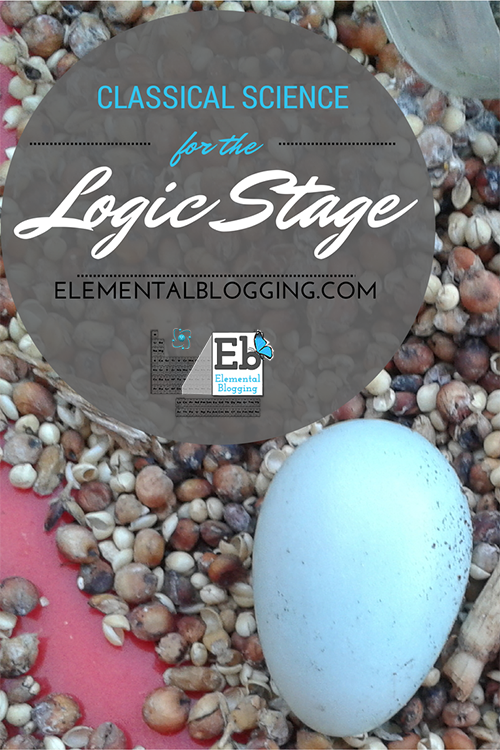 Welcome to the next installment of the Classical Education and Homeschool Science series! So far, I have shared:
Welcome to the next installment of the Classical Education and Homeschool Science series! So far, I have shared:
- The basics of classical education;
- The rigors of classical science;
- And ideas for classical science curriculum for the grammar stage student.
Today, I want to share a brief overview of what classical science curriculum can look like for the logic stage student.
What is a logic stage student?
The logic stage is also often to as the dialectic stage, both of which can be a bit cryptic. So let me clear up the confusion by saying that I mean the years when the student has already mastered the basic facts and is beginning to apply them as he or she learns new concepts.
These are the years when the student questions everything and has a strong desire to know why. During the logic stage years the student is assaulting you with questions that begin with, “But, why __________”. If you have a logic stage student, you know exactly what I mean. If not, trust me when I say — it will be clear when your student has entered the logic stage.
We like to compare the logic stage student to a bucket full of unorganized information that needs to be filed away and stored in a cabinet. This student wants to know why things work the way they do.
So, when teaching science to this age group you will be playing to these strengths while teaching him or her to make connections between the pieces of knowledge that were deposited during the grammar stage years. You can also use science to work on the basic skills of outlining, critical thinking and reading comprehension at this stage.
What are the goals for teaching science to the logic stage student?
Your goals for teaching science to the logic stage student are three-fold:
- To begin to train the student’s brain to think analytically about the facts of science.
- To familiarize the student with the basics of the scientific method through inquiry-based methods.
- To continue to feed the student with information about the world around them.
In a nutshell, your goal for these years is to capitalize on the students need to know why as you continue to feed him or her with scientific information.
What should classical science curriculum for the logic stage student look like?
In a classical science curriculum, the above goals can be fulfilled through the following four basic components and three optional ones. The basic components are:
- Experiments — The purpose of the experiments during the logic stage years is to give the student an opportunity to interact with science through hands-on inquiry-based methods. This will allow the student to experience real-life science, to build his or her problem-solving skills, and to practice using the basics of the scientific method. These experiments should be more involved and more detailed at this stage than the scientific demonstrations from the grammar stage years. The student will move into performing these on his or her own, while you as the teacher act as an advisor. He or she will also need to write a more detailed lab report for each experiment.
- Information — The information component is comprised of three interlocked pieces: books, vocabulary, and diagrams. The logic stage student still needs to be reading from an encyclopedia or textbook weekly so that he or she will continue to build a broad knowledge base. The student should also be discussing the material that he or she is reading with you on a more formal level. This will help him or her to organize and store the information properly. By discussing what has been read, you are teaching them to think critically about the passage as well as modeling how to pick out the important facts. As you discuss the material, you will also want to highlight any unfamiliar vocabulary and have the student write those definitions into his or her student notebook. The student should also be drawing and labeling a diagram that depicts the key information from what was read, if possible.
- Writing — The purpose of the writing component is to teach the student how to process and organize information. You want the student to be able to read a passage, pull out the main ideas, and communicate those facts in his or her own words. Your discussion time with the student has already prepared him or her for this task. Now, you are simply asking him or her to write a record of what he or she has learned and discussed with you. The classical student will typically do this in the form of several paragraphs or as an outline. I recommend Susan Wise Bauer’s book The Complete Writer: Writing with Ease to help you see the progress of writing skills through the years.
- The Science Project — Once a year, every logic student should complete a science fair project. His or her project should work through the scientific method from start to finish on a basic level, meaning that the question should be relatively easy to answer. At this point, you need to thoroughly explain each step and coach the student through the entire process. Your job is to work alongside the student as an advisor from the time he or she formulates the question until he or she polishes up the conclusion so that the student learns the process correctly from the beginning.
The optional components are:
- Around the Web — It’s a good idea to have the logic stage student get some experience with researching on the internet. So for this optional component, you can have the student, under your supervision, search the internet for websites, YouTube videos, virtual tours and activities that relate to what they are studying or for a brief research report if you feel the student needs to work in that area. You can also have the student study current events in science or key people in the field through scientist biographies.
- Quizzes or Tests — During the logic stage years, it is not absolutely necessary that you give quizzes or tests to the student. However, if you want to familiarize them with test taking skills, we suggest that you give quizzes or tests that will set the student up for success. You can do this by only testing material that has been thoroughly covered during class time. The questions can include matching vocabulary, true/false questions about the important concepts you have discussed as well as brief short answer questions.
- Timeline — In the logic stage the classical student will begin keeping a timeline and he or she should be adding scientific discoveries to this as well. This give the student and opportunity to make a connection between history and science, for example, he or she would see that the lack of new scientific discoveries and the Dark Ages are connected. The timeline is another tool to help the logic stage student analyze and assimilate what he or she is learning.
When you plan out your year of logic stage science, make sure that all these pieces tie together.
In other words, your week can look like this:
- Do an experiment on how heat affects the storms on Jupiter’s surface;
- Read about the planet and discuss with the student what he or she has learned;
- Have him or her write outline or write a report on the planet;
- Have him or her record any unfamiliar vocabulary and then sketch Jupiter with its major features;
- Mark on a timeline when Jupiter was discovered and named;
- Have him or her research more about Jupiter and any recent discoveries surrounding the planet.
Finally, when the student finishes learning about the celestial bodies, give him or her a test on the information.
When you tie all of the areas together, they reinforce one another and create a stronger file of knowledge in the mind of the logic stage student.
Resources for creating a classical science curriculum
I highly recommend the following books to help you formulate a plan for your classical science curriculum:
- The Well-trained Mind: A Guide to Classical Education at Home by Jessie Wise and Susan Wise Bauer — The suggestions in this post are loosely based on this book and I believe that this book should be required reading for all classical educators! It will give you a fuller picture of classical education as well as the learning stages that your students will go through.
- Success in Science: A Manual for Excellence in Science Education by Bradley and Paige Hudson — Brad and I have written this book to be a starting point for those desiring to teach science. It lays out a clear roadmap for teaching this subject in your homeschool. While the book is not aimed specifically at classical educators there are several sections that will help you to gain a clearer picture of what classical science can look like.
If you don’t want to design your own classical science curriculum for you logic stage student, check out the programs of Elemental Science. We have created a full line of logic stage curricula that makes classical science easy for homeschoolers!
If you have any questions about classical science, please feel free to leave them in the comments and I answer them as soon as I am able.
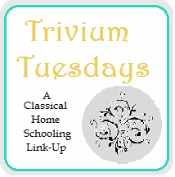
I’ve added this post to the classical homeschooling link-up, “Trivium Tuesdays” hosted by Living and Learning at Home. There is a wealth of information on the subject in these posts, so be sure to check it out!
Next month, I’ll be sharing more specifics for the rhetoric stage. If you don’t want to miss that article, be sure to subscribe here.
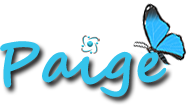
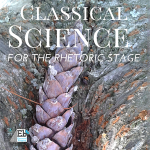
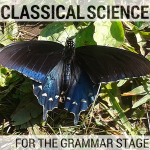
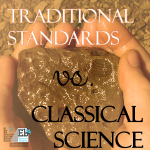


Join the Community!